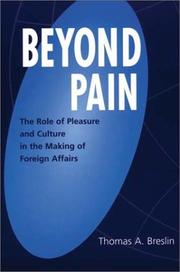| Listing 1 - 3 of 3 |
Sort by
|
Book
ISBN: 027100259X 9780271002590 Year: 1980 Publisher: Philadelphia (Pa.): Pennsylvania State university press
Abstract | Keywords | Export | Availability | Bookmark
 Loading...
Loading...Choose an application
- Reference Manager
- EndNote
- RefWorks (Direct export to RefWorks)
Missions, American --- Catholic Church --- Missions --- S09/0600 --- S09/0610 --- S13B/0430 --- S13B/0432 --- S13B/0620 --- 266.3*51 --- -#SML: Joseph Spae --- #SML: Henry Serruys --- American missions --- China: Foreign relations and world politics--China and USA: general and before 1949 --- China: Foreign relations and world politics--China and USA: since 1949 --- China: Christianity--Missionary works (RC) and activities of the Catholic Church : 1840-1900 --- China: Christianity--Missionary works (RC) and activities of the Catholic Church: 1900-1949 --- China: Christianity--Catholic Church under communism: general --- Missiografie--?*51 --- -Church of Rome --- Roman Catholic Church --- Katholische Kirche --- Katolyt︠s︡ʹka t︠s︡erkva --- Römisch-Katholische Kirche --- Römische Kirche --- Ecclesia Catholica --- Eglise catholique --- Eglise catholique-romaine --- Katolicheskai︠a︡ t︠s︡erkovʹ --- Chiesa cattolica --- Iglesia Católica --- Kościół Katolicki --- Katolicki Kościół --- Kościół Rzymskokatolicki --- Nihon Katorikku Kyōkai --- Katholikē Ekklēsia --- Gereja Katolik --- Kenesiyah ha-Ḳatolit --- Kanisa Katoliki --- כנסיה הקתולית --- כנסייה הקתולית --- 가톨릭교 --- 천주교 --- -Missions, American --- -Missions --- -S09/0600 --- 266.3*51 Missiografie--?*51 --- #SML: Joseph Spae --- Church of Rome --- Missions, American - China

ISBN: 0275974308 0275974316 0313046352 9780313046353 9780275974305 9780275974312 128037389X 9786610373895 0313073651 9780313073656 6610373892 9798400618055 Year: 2002 Publisher: Westport, Conn. Praeger
Abstract | Keywords | Export | Availability | Bookmark
 Loading...
Loading...Choose an application
- Reference Manager
- EndNote
- RefWorks (Direct export to RefWorks)
Breslin demonstrates that, for two millennia, states in East Asia, Europe, and America have successfully used pleasure to protect themselves and advance their interests, at a small fraction of the cost of militarized policies. Indeed, the Chinese demonstrated that pleasure-based policies primed a stream of highly profitable foreign trade and bolstered the state. Pleasure was feared because it was effective as both an offensive and defensive strategy. The colleens of Ireland and the bibis of India showed how inexorably effective pleasure could be in confounding militarily stronger invaders. In contrast, resorting to violence and pain generally undermined aggressive states. Cultural factors have shaped the choice of pleasures used. Food-centered China has used food, as well as sex and tourism, as tools in its foreign relations. Rome used wine; Byzantium, precious metals, banquets, and public spectacles; Venice, sex, money, and art; England, money and education. America has used sex, money, education, music, and tourism. Breslin's provocative text is based on a wide reading of secondary sources and some primary sources as well as a quarter century of teaching the history of foreign relations.
International relations and culture. --- Diplomacy. --- Pleasure. --- Pain. --- Emotions --- Ethics --- Senses and sensation --- Utilitarianism --- Happiness --- Hedonism --- History --- International relations --- Culture and international relations --- Culture --- Aches --- Pleasure --- Symptoms --- Analgesia --- Suffering
Book
ISBN: 081300800X Year: 1986 Publisher: Gainesville University presses of Florida
Abstract | Keywords | Export | Availability | Bookmark
 Loading...
Loading...Choose an application
- Reference Manager
- EndNote
- RefWorks (Direct export to RefWorks)
China --- United States --- Foreign relations --- History
| Listing 1 - 3 of 3 |
Sort by
|

 Search
Search Feedback
Feedback About UniCat
About UniCat  Help
Help News
News